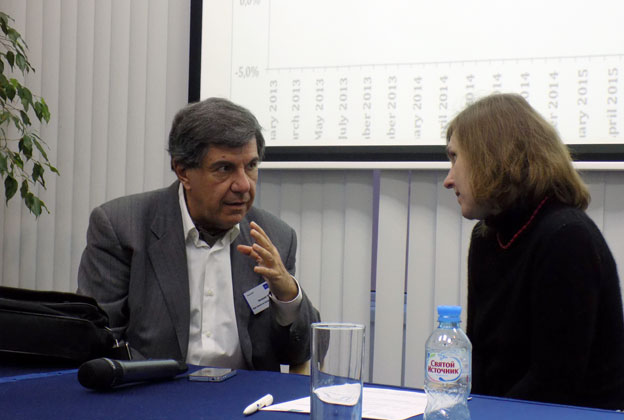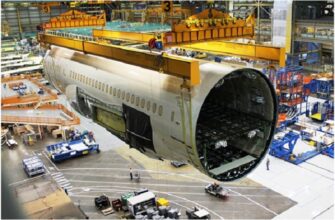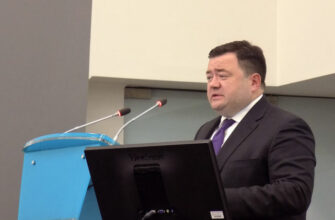«Growth is slowly, but definately returning», – defined the current economic situation in our country the economist Jacques Sapir, Professor of the graduate School of Research in Social Sciences (EHESS) of Paris and academician in his briefing to the Association of European Businesses (AEB) February 9, 2017.
Among the areas of the economy, the best results, according to a prominent expert in the strategic development of the Russian economy, show agriculture, metallurgy and food production. Answering the question where to invest, the speaker recommended to be guided not by the industry, but by a particular enterprise: «Precise opportunity may be linked with productivity chain», – he said.
J. Sapir shared information that at the moment among economists there have been discussions about the methods of development of the country. In addition to the usual discussion on the ruble and inflation, demographic trends, education and investment, a possible decision could be the introduction of progressive taxation. Thus, in his view, the equilibration of the budget depends not so much on the economic situation, but rather by the political will of the government. “Will the government think static like now, or it will begin to think dynamically? In Europe and the U.S. there is this dilemma”. Speaking of partners… According to Jacques Sapir, the sanctions will not be removed until the elections in Germany.
With regard to consumption, the fact that the consumer basket has not changed in 2016 makes a concern. In the case of maintaining a high social cost, J. Sapir predicted the Russian economy growth of 2-3% in 2018-2019, the increase should preferably be directed to increasing salaries, maintaining motivation, productivity and wage growth. In addition, “the subsidy is good, he said, but it have a cost”.
After the briefing, Jacques Sapir has kindly agreed to give an interview to the cultural-political magazine “E-Vesti”:
EV: We would like to know. One thing is interesting the most of all when you made some comparison of Russian political choices. And we are waiting for the decision you told. And things that take place in Eltsin in Europe. Could you please tell a little bit more about the same things outside?
Jacques Sapir: What track me is a fact that political choices in Russia right now are pretty the same as choice we are facing in European Union, in France or even in the United States. It is a common an economic problem, you know, as a fact that first we have a disjointed monetary policy with the budget policy. That is one of the major problems in all developed countries and right now Russia is a part of developed countries. It is to be understood. And that is why we have the problem of rising inequality of income. Which is a problem in USA, a problem in a lot of European countries. My colleague Thomas Piketty has written a very important book on that (approx.ed. “Capital in the Twenty-First Century”), we are working in the same academic institution in Paris (approx.ed. École des hautes études en sciences sociales, EHESS) and of course we are saying also this problem of income inequality quite important as a constrained for economic development in Russia. So what tracks me is the fact that right now the problem the debate about economic development is more or less the same in Russia than it is in European Union or in the United States. Of course, after that we have some specifity, some national specifity and everybody understands that raw materials commodities are playing a much greater role of development of Russian economy than in France. In France we have no oil, whatever, no wood. OK. It is an obvious difference. So, I think that debate about the problem of economic development is to take a specific form in different countries now. Of course, the debate will not be the same in France, which it is in Germany, not the same in Germany as in Italy, in the United States. But the questions, you know, are common for all these countries and Russia of course.
EV: Thank you. You have mentioned a lot of things, but I haven’t heard from you one thing which is already common like budget rule, which is linked now in Russia with oil. Do you think we should change the approach to budget rule?
Jacques Sapir: Actually the Russian budget is quite evidently linked to oil price. Its follow is known. Oil and gas production is making just less than 10% of GDP, but is making for more than 40% of budget incomes. So it is quite important. Now Russian budget has been computed on basis an oil price of 40 USD per barrel. And the actual price of oil is to be become between 46 to 62 USD. So the problem is either the Russian Government will keep the surplus of income to rebuild the budget fund for coming years such a possibility. Or it could increase its expenditures and let the budget equilibrium to come not by this year, not by next year but to come by 2019 or even 2020. This is a very important choice because this topic of budget expenditure is to some extend also linked to rate of growth, and to some extend you’ve here very interesting problem. You could make a kind of budget computations and this budget computation is giving you given rate of growth if you have a higher rate of growth than the rate of growth you have computed. Let’s say the rate of growth you have computed is 1.5% and you are reaching 2.0% rate of growth than you will have an extra bonus of income that will to some extend either help you to build a budget surplus or to spend more on infrastructure or social issues. So to some extend you don’t have a process what you are computing your budget and you have on the other hand your rate of growth. The two are strongly linked and you have to understand the dynamics of the link between the rate of growth and the budget. And the problem is that very few governments are able to understand the dynamics for just one reason, because every government, I am not saying about some specifity of Russia, it’s also true in France and also true in Great Britain. All government had some time to present a budget to the Parliament that is a democracy. But the problem is that the government could not tell the Parliament, well – we are giving you some figures but the adjust provisional figures we don’t know where we will be in the end of the year. Nevertheless, this is a truth the government can’t now precisely where the country will stand by the end of the year. So it’s important to have understanding that the link between the budget and GDP is very dynamic link and not a static link.
EV: The last question is regarding productivity. Do you have data on comparison with European Union and Russia? Because I’ve heard that Russian productivity differs from Eastern European productivity.
Jacques Sapir: On the level it is quite difficult because of the way of computing productivity are not exactly comparable between different countries. What can be seen is that the rate of productivity growth in Russia since 2013 after the big financial crisis. The real growth of productivity is a much higher than in Western Europe and then even in Eastern Europe, but one country which had a rate of productivity more less equal or even slightly larger than Russia, that is Poland. It is quite important to understand that in long terms that from 2002 to 2013 or 2014 the average productivity, rate of growth of Russia has been around 3.0-3.5% a year. In France it has been 2%. So this is showing you that Russia is slowly catching gap with Western European countries. And what is quite interesting is the fact that among Eastern European countries Russia has overtaken a lot of countries but one country which is still growing faster at least for productivity than Russia, which is Poland.




